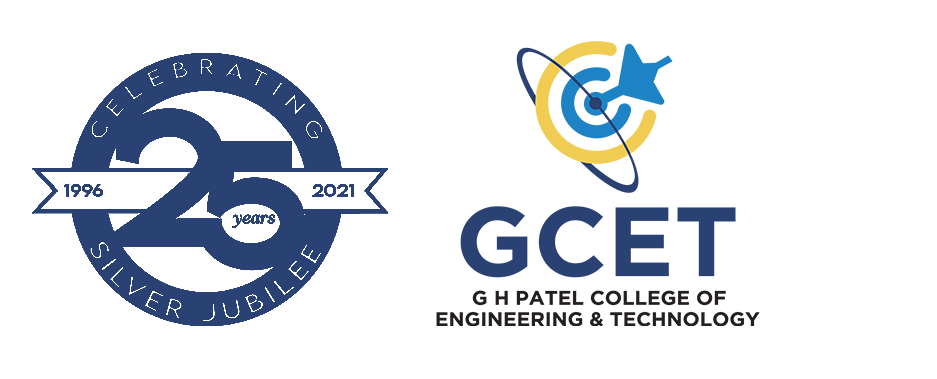Department of Computer Engineering offers a four year undergraduate program in Computer Engineering, with an intake of 40 students in the year 1999 (current intake is 60 students), originally affiliated to Sardar Patel University, Vallabh Vidyanagar till 2007 and later to Gujarat Technological University (GTU), Ahmedabad (2008-2020). Department started offering a Master of Engineering program from the year 2017-18, with an intake of 18 students. From academic year 2020-21, the GCET is now one of the constituent colleges under CVM University. Department offers a B. Tech program in Computer Science and Design with an intake of 60 students from the academic year 2021-22. The department gave its first meritorious batch of Computer Engineering graduates in July 2003.
Majority of the passed out students are well placed at Infosys, Wipro, IBM, Intel, Capgemini, Microsoft, Tech Mahindra etc. or have pursued higher studies. The Department has excellent laboratory facilities, both for teaching and research.
The Department organizes workshops, seminars, conferences at national and international levels on various topics of current relevance and invites eminent speakers from India and abroad to impart state of art knowledge to the students.
The undergraduate program in Computer Engineering is accredited by the National Board of Accreditation, New Delhi :
For the period of 3 years from 15th March 2012.
For the period of 3 years up to 30th June 2025 (i.e. A.Y. 2022-23,2023-24 and 2024-25).
Dedicated, young and well qualified faculty members are an asset to the department.
The B.Tech. in
Computer Science and Design aims to prepare students to be affluent in
problem-solving through computational tools and techniques, with additional
experience with Design tools and technologies. The program incorporates a set
of courses focused on Design and Digital Media, which will
augment student’s capabilities to work in the software industry as well as
digital media industry like gaming and animation, virtual/augmented reality,
visualization, etc. The program aims to develop capabilities in CS as well as
Design and Digital Media.
To produce globally competitive computer engineers, who are prepared to accept the challenges at professional level, while maintaining the core values.
- To create excellent teaching learning environment.
- To mould engineers with a strong foundation of scientific knowledge and engineering concepts.
- To enhance the acquired concepts and develop new technology through excellence in research.
- To assist nation building and elevating the quality of life of the people through leadership in professionalism, education, research and public services.
Programme Educational Objectives
- To educate young aspirants with the fundamentals of engineering and knowledge of latest technologies.
- To encourage the students to remain updated by pursuing higher degree or certification programs.
- To assume management and leadership roles to contribute in socio-economic development of the nation.
Programme Outcomes
- Engineering knowledge: Apply the knowledge of mathematics, science, engineering fundamentals, and an engineering specialization to the solution of complex engineering problems.
- Problem analysis: Identify, formulate, review research literature, and analyze complex engineering problems reaching substantiated conclusions using first principles of mathematics, natural sciences, and engineering sciences.
- Design/development of solutions: Design solutions for complex engineering problems and design system components or processes that meet the specified needs with appropriate consideration for the public health and safety, and the cultural, societal, and environmental considerations.
- Conduct investigations of complex problems: Use research-based knowledge and research methods including design of experiments, analysis and interpretation of data, and synthesis of the information to provide valid conclusions.
- Modern tool usage: Create, select, and apply appropriate techniques, resources, and modern engineering and IT tools including prediction and modeling to complex engineering activities with an understanding of the limitations.
- The engineer and society: Apply reasoning informed by the contextual knowledge to assess societal, health, safety, legal and cultural issues and the consequent responsibilities relevant to the professional engineering practice.
- Environment and sustainability: Understand the impact of the professional engineering solutions in societal and environmental contexts, and demonstrate the knowledge of, and need for sustainable development.
- Ethics: Apply ethical principles and commit to professional ethics and responsibilities and norms of the engineering practice.
- Individual and team work: Function effectively as an individual, and as a member or leader in diverse teams, and in multidisciplinary settings.
- Communication: Communicate effectively on complex engineering activities with the engineering community and with society at large, such as, being able to comprehend and write effective reports and design documentation, make effective presentations, and give and receive clear instructions.
- Project management and finance: Demonstrate knowledge and understanding of the engineering and management principles and apply these to one's own work, as a member and leader in a team, to manage projects and in multidisciplinary environments.
- Life-long learning: Recognize the need for, and have the preparation and ability to engage in independent and life-long learning in the broadest context of technological change.
Programme Specific Outcomes
- Apply the concepts and fundamentals of engineering, mathematics and computer program to solve real life problems.
- Apply policies, procedures and practices in the software project development using various programing language, open source technologies, framework and Tools.
- Address the computational issues for domain specific problem by using appropriate algorithms.
-
SELECT description FROM depthome where dept_id like 'UGCP' and category='PSO'
- Apply the concepts and fundamentals of engineering, mathematics and computer program to solve real life problems.
- Apply policies, procedures and practices in the software project development using various programing language, open source technologies, framework and Tools.
- Address the computational issues for domain specific problem by using appropriate algorithms.

